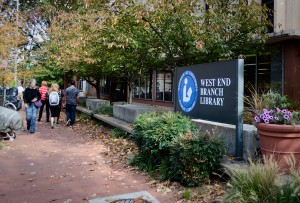By Thomas Hedges – You can find Hedges’s reports at Truthdig. He works at The Center for Responsive Law, founded by Ralph Nader
The non-profit group D.C. Library Renaissance Project (DCLRP) worries that a deal between city officials and developer Eastbanc, which was awarded the rights to develop three plots of land in the West End neighborhood, will not only shortchange taxpayers but set an unsavory precedent for the way D.C. does business with private developers in the future.
Under the West End Parcels deal, the city will give the land to Eastbanc in exchange for building a new replacement library and fire station, which Eastbanc says will total $20 million. According to the DCLRP the costs are inflated but far worse is the land value being given away – $100 million, they say.
The West End’s Advisory Neighborhood Commission and its civic groups, however, dispute that number, and they’re in favor of the deal. In a letter to Ralph Nader, DCLRP’s founder, they wrote, “The community as a whole agrees with our support of the now approved development plan for the library. They believe that the proposed new library, fire station, and affordable housing are extraordinary community benefits needed to replace our outdated facilities.”
Initially, a similar deal to the same developer was challenged and rescinded in 2007, when the DC Council, at the request of then-Mayor Adrian Fenty, enacted emergency legislation to hand over the West End parcels without giving notice to the public.
By law, the city should have put out a request for proposals and selected the highest bid. Three years after the original deal was killed, the city finally did issue a request for proposals. It received two bids: one from Toll Brothers and one from Eastbanc. The city selected Eastbanc.
Under the new deal, the office of the Deputy Mayor for Planning and Economic Development (DMPED) has given Eastbanc $2 million in tax breaks and supported a waiver of the affordable housing mandate of the 2006 Inclusionary Zoning law, which called for 14 affordable units out of the proposed condominium’s 180. DCLRP is, among other measures, challenging the Zoning Commission’s formal granting of the waiver in the Court of Appeals.
The Inclusionary Zoning Law was an effort to integrate lower income families instead of sequestering them into what many call ‘the projects.’
“This deal is a mystery to me,” says DCLRP attorney Oliver Hall. “If the city council had put this property [up] for sale on the open market and sold it to the highest bidder,” he says, “they would have so much money that they would be able to not only to maximize their profit but build a separate library and have money left over to improve the overall library system which is what D.C. law requires” with the LEAD Library Enhancement, Assessment and Development Act. “They’re violating that act.”
Director of DCLRP Robin Diener says that the government is aware of its giveaway. The District’s CFO, she says, had to calculate the recordation fee, a charge to put the purchased real estate on public record, which amounts to a fixed 1.45 percent of the market value. Diener found, after reversing the formula, that the CFO had assigned a value of $100 million to the land.
Eastbanc is the first contractor to have its affordable housing requirement waived by the Zoning Commission since the new Inclusionary Zoning Law. The city gave the project to Eastbanc because it said it didn’t have enough money to do it itself. But when Eastbanc threatened to abandon the project if the affordable housing wasn’t waived, the city suddenly found $7 million to use for those extra units, which will be owned by Eastbanc.
This, according to the DCLRP, could set another powerful precedent, where developers hide behind the veil of public works to avoid building units that won’t bring in wealthy residents.
“There’s something sick about [the waiver],” says DCLRP organizer Chris Otten. “It’s preferential treatment — segregating poor folks out from the condos, the fact that they’re putting them above a fire station. There’s this weird discrimination aspect to all of this that we want to pursue in terms of poor planning as a form of that discrimination.”
Otten and Hall say that many people in the community have signed on to the project because of fatigue. It makes sense that the librarian wants a new library and the fire chief a new fire station.
“But at what cost?” Hall asks. “When you give up your public land, you don’t get it back. You lose your constitutional rights on that land.”
“Right now,” he says, “we have a free-standing library and a free-standing fire station. They’re on their own plots of land which the public owns. When all is done with this deal, the library is going to be on the ground floor of a building wholly owned by a private developer which is going to have nine floors of luxury condominiums on top of the library with a roof-deck pool. The fire station is going to be similarly encumbered. What happens in 15 years if Eastbanc goes bankrupt or is sold to another developer? Who knows what’s going to happen? Say we want to expand the library — well we bargained it away to Eastbanc.”
“The public interest has become subservient to the corporate interests,” he says, “not only physically, but legally, economically, financially — it’s all going to be subservient to the private interest of the developers.”
The connections between D.C. local officials and Eastbanc, Hall says, are incestuous. The revolving door spins so fast it’s hard to keep track of who’s moved from the public sector to private, and vise versa.
Legal assistant Sharon S. Schellin, for example, worked at Holland and Knight, the law firm that represented Eastbanc in front of the Zoning Commission, before moving over to the Zoning Commission itself. (Eastbanc is now represented by the law firm Pillsbury Winthrop Shaw Pittman.)
Neil Albert was Deputy Mayor for Planning and Economic Development in 2007 when the properties were handed over to Eastbanc without public notice. Albert now works for Holland and Knight and owns an investment property across the street from the West End Library property.
Both Hall and Otten believe that the politicians backing this deal are doing so for self-promotion. They are too closely tied to the private sector to make decisions on behalf of public interest, they say.
Four council members were asked several times via email to rebut the allegations. None responded.
This private undertaking of public services for the sake of one’s career, Hall says, will set a dangerous trend in America.
“We’ve managed to sustain things like schools, fire stations, libraries, museums,” he says. “Suddenly we’re being told that that model which has prevailed in the United States from the beginning is no longer viable, and that the only way we can sustain these public institutions is by making them wholly subservient and subsidiary to private interest.”
“You could say the same thing about the National Archives that Eastbanc and the Zoning Commission are saying about the West End library: ‘It’s an underutilized property; it needs to be revitalized; look at it, there’s only a couple pieces of paper in there; let’s turn the property over to a private developer, have the developer redevelop the property, and sure they’ll put a hotel in there, but we’ll get a new national archives. It’ll be a newer safer place for the Constitution and the Declaration of Independence.”
Related links: savedclibraries.org


